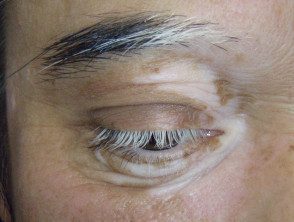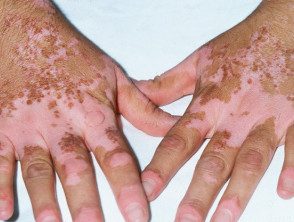What is Alezzandrini? syndrome?
Alezzandrini syndrome is characterized by depigmentation.
- Unilateral degeneration of the pigmented retina layer
- Ipsilateral facial vitiligo
- Poliosis (loss of color of a patch of hair)
- Reduced hearing
Alezzandrini syndrome has been closely associated with Vogt-Koyanagi-Harada syndrome (VKH), as they share similar cutaneous and ocular signs. Neurological typical implication of VKH syndrome (8)th cranial and sterile nerve damage meningitis) are not reported in Alezzandrini syndrome. The connection between the syndromes remains unknown.
Who gets Alezzandrini syndrome?
Only a few patients with Alezzandrini syndrome, who were men and women between 12 and 30 years of age at presentation, have been described.
What causes Alezzandrini syndrome?
The cause of Alezzandrini syndrome remains unknown. Viral or autoimmune processes leading to melanocyte Destruction has been suggested. Melanocytes They migrate to the skin, retinas, uvea, cochlea and vestibular labyrinths, so any of these sites can be affected.
What are the clinical features of Alezzandrini syndrome?
The initial presentation may be a unilateral gradual loss of vision, followed by facial vitiligo and ipsilateral poliosis several years later. Reduced sensitivity to ipsilateral sound or hearing loss may also develop. Bilateral Deafness has been reported in one patient.
Loss of pigmentation of the skin and hair.

Poliosis

Vitiligo
How is Alezzandrini syndrome diagnosed?
Alezzandrini syndrome is diagnosed by recognizing the clinical presentation.
Ophthalmological Investigations to assess complications may include:
- Eye fundus exam
- Visual acuity test
- Autofluorescence background
- Optical coherence tomography-spectral domain image
Audiometry is performed to assess hearing loss.
What is the treatment for Alezzandrini syndrome?
There are no treatments for Alezzandrini syndrome.
- Current Steroids have limited benefit for vitiligo.
-
Sun protection is important to prevent sunburn on the skin affected by vitiligo.
-
Skin Cancer The risk must be evaluated.
What is the result of Alezzandrini syndrome?
Due to the small number of reported cases, the forecast of patients with this syndrome remains unknown.
Patients experience gradual loss of vision and, in some cases, progressive hearing loss. They have an increased risk of retinal detachment.

